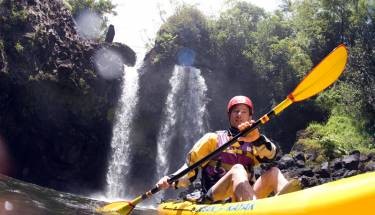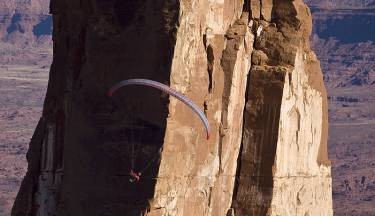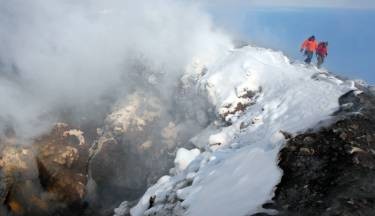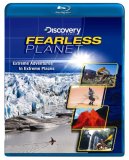| Reviews & Columns |
|
Reviews DVD TV on DVD Blu-ray 4K UHD International DVDs In Theaters Reviews by Studio Video Games Features Collector Series DVDs Easter Egg Database Interviews DVD Talk Radio Feature Articles Columns Anime Talk DVD Savant Horror DVDs The M.O.D. Squad Art House HD Talk Silent DVD
|
DVD Talk Forum |
|
|
| Resources |
|
DVD Price Search Customer Service #'s RCE Info Links |
|
Columns
|
|
|
Fearless Planet
Discovery Channel // Unrated // June 3, 2008 // Region 0
List Price: $34.98 [Buy now and save at Amazon]
The world around us was carved into existence by cataclysmic geological events, and in order to better understand it, scientists and researchers sometimes have to be willing to subject themselves to extremes as well. That's the premise of Fearless Planet, a Discovery Channel documentary series that explores  the formation of some of the planet's most awe-inspiring spectacles as well as the lengths necessary to fully study them. Through a combination of following researchers subjecting themselves to great risk in the field and large-scale computer graphics reproducing hundreds of millions of years of geologic change, Fearless Planet gives viewers a look into how some of the most visually dazzling stretches of the globe -- the Sahara Desert, Hawaii, Alaska, the Grand Canyon, and the Great Barrier Reef -- were formed.
the formation of some of the planet's most awe-inspiring spectacles as well as the lengths necessary to fully study them. Through a combination of following researchers subjecting themselves to great risk in the field and large-scale computer graphics reproducing hundreds of millions of years of geologic change, Fearless Planet gives viewers a look into how some of the most visually dazzling stretches of the globe -- the Sahara Desert, Hawaii, Alaska, the Grand Canyon, and the Great Barrier Reef -- were formed.
Part travelogue and part nature documentary, Fearless Planet boasts the sort of startlingly beautiful imagery that demands to be seen in high definition. It certainly does a wonderful job at conveying the scale and spectacle of the world around us: a Hawaiian mountain that would tower a mile above Everest if so much of it hadn't been submerged in water, the Great Barrier Reef's distinction as both the largest structure in the world as well as its most diverse ecosystem, and the majesty of the Northern Lights. Another of Fearless Planet's strengths is its emphasis on how tightly interconnected disparate stretches of the globe can be. While exploring the desolate Sahara Desert, for instance, the series aims its cameras at a lush South American jungle; these two unrecognizably different enivronments may be a world removed from one another, but they were once connected, and clues to better understanding the driest place on the planet can be found in a jungle thousands of miles away.
Fearless Planet attempts to document researchers making discoveries as they happen, and some of these do some genuine, such as a sample of reef being carved out 190 feet below the ocean's surface, far deeper than that sort of coral had been thought to thrive. So many of the "discoveries" seem staged and even awkwardly acted, though. Instead of relying on omniscient narration and feigned discoveries, maybe Fearless Planet would've played better if the researchers themselves told the story, explaining Earth's geologic past to viewers as they explore instead of long, long shots of paddling or rock climbing.
The tagline for Fearless Planet reads "extreme adventures in extreme places", and again, that extreme angle is uneven, clumsily mixing genuine research with gimmickry aimed at snagging a younger demo for advertisers. There clearly is danger inherent to exploring these areas. In one of the earlier episodes, a geologist carefully walks across a treacherous, volcanic stretch of land, claws at molten rock with a hammer, and drops chunks of it into a coffee can filled with water. One false move could cost him his life -- or, at the very least, the better part of his leg -- but this helps him look for abnormalities that hint at threats to the lives of many thousands of people in the area. Clawing up a glacier in search of clues why permafrost in place for tens of thousands of years is just now starting to melt...the answer may be obvious, but that too I understand. Even seeing climbers scale the sheer 400 ft. Castleton Tower in the scorching desert or the dives through cave-like lava tubes seem to have some sincere scientific merit behind them. Much of the extreme action kind of just seems gratuitous, though. No matter where he goes, Will Gadd finds some excuse to leap in a kayak or soar in a paraglider, and...why? More often than not, Fearless Planet doesn't bother with an explanation or just half-heartedly rattles off some excuse about it being part of understanding the world around us. It just seems to derail the documentary feel of the series to have a snowboarder bounding around Saharan dunes, a surfer suddenly tear across 20 foot waves, or Gadd kayak inside a torrential river inside a glacier.
400 ft. Castleton Tower in the scorching desert or the dives through cave-like lava tubes seem to have some sincere scientific merit behind them. Much of the extreme action kind of just seems gratuitous, though. No matter where he goes, Will Gadd finds some excuse to leap in a kayak or soar in a paraglider, and...why? More often than not, Fearless Planet doesn't bother with an explanation or just half-heartedly rattles off some excuse about it being part of understanding the world around us. It just seems to derail the documentary feel of the series to have a snowboarder bounding around Saharan dunes, a surfer suddenly tear across 20 foot waves, or Gadd kayak inside a torrential river inside a glacier.
Fearless Planet can be kind of repetitive as well. The narration tends to be overuse the same few words over and over again, belting out "catastrophic", "collision", and "extremes" so frequently that it's halfway to a drinking game. The series does make very nice use of computer graphics -- filling the Saharan desert up with oceans of water, reducing the formation of these sprawling spectacles from hundreds of millions of years to mere seconds, and showing the collision of entire planets, to name just a few -- but some of the CG is recycled repeatedly, often in the space of the same episode. The sixth and final installment of the series is itself microwaved leftovers. Fearless Planet ends with the 4.5 billion year story of our planet and its transformation from a volcanic hell to the world we live in today, but aside from some new CG work, it's essentially a 'best of' nicking scenes from the other five episodes and kind of a waste for anyone who's already sat through them.
Fearless Planet aims to educate and entertain, but it does too uneven a job at achieving either of those goals to recommend as a purchase sight-unseen on Blu-ray. I'd suggest that anyone who's intrigued wait for a reairing on the Discovery Channel or opt for a rental first. Rent It.
Video: Fearless Planet's 1080i, VC-1 encoded video can be erratic but is generally solid, making use of the additional breathing room on Blu-ray to stand a notch above similar documentaries that I'm used to seeing on cable high-def channels. Shot predominately on HD video with certain slow motion segments apparently captured on 16mm film, the 1.78:1 image is predominately sharp and very nicely detailed, both in tight closeups of the researchers as well as expansive shots of the geological spectacles around them. The occasional use of stock footage and extensive CGI work leaves the overall quality somewhat uneven, though. A documentary series on the Discovery Channel naturally doesn't have tens of millions of dollars to devote to visual effects, and because the scale of the geologic changes and colossal transformations that Fearless Planet attempts to reproduce is so enormous, the CG looks as if it's been softened to try to mask its modest budget.
What really caught me off-guard is how clumsy the compression work can be. Portions of the image can be extremely unstable, exhibiting heavier artifacting than any other Blu-ray release I can think of offhand. Rocky cave walls and the leaves on distant shots of trees can sparkle and shimmer, and portions of a map of Arizona look almost blocky as they pan by. The artifacting is light enough that viewers with more of a casual interest in home theater might not ever notice, but to my eyes, they really shouldn't have made it past a quality check and knock down the overall score by a half-star. Maybe Fearless Planet would've been better served by an upgrade to BD-50 or even just spreading out to a third BD-25 disc.
other Blu-ray release I can think of offhand. Rocky cave walls and the leaves on distant shots of trees can sparkle and shimmer, and portions of a map of Arizona look almost blocky as they pan by. The artifacting is light enough that viewers with more of a casual interest in home theater might not ever notice, but to my eyes, they really shouldn't have made it past a quality check and knock down the overall score by a half-star. Maybe Fearless Planet would've been better served by an upgrade to BD-50 or even just spreading out to a third BD-25 disc.
Audio: Although there isn't a lossless soundtrack this time around, the Dolby Digital 5.1 audio -- encoded at the usual bitrate of 640Kbps -- sounds better than expected for a basic cable documentary series. The mix does a nice job filling the room with sound, reinforcing the action up front by inundating the surrounds with whirling effects and reams of music. Bass response is modest compared to a feature film but at least a bit heftier than I went in expecting. Some of the early effects sound almost anemic, admittedly -- a meteor colliding with the earth doesn't make much of a low-frequency impact, for instance -- but colossal tidal waves and rending of entire continents are bolstered by a fairly massive roar. None of the narration is buried in the mix even in Fearless Planet's more punishing moments. Nothing exceptional but nicely done nonetheless.
A Dolby Digital stereo track has also been included along with a set of optional English subtitles. The packaging incorrectly lists subtitles in French and Spanish as well, although this is a misprint.
Extras: None.
Fearless Planet is a two disc set, and it comes packaged in a transparent white case rather than the familiar bright blue.
Conclusion: Even though I appreciate the scale of what Fearless Planet is trying to convey, the extreme research angle frequently feels like more of a gimmick than the backbone of a documentary series. It can be so eager to weave in footage of kayaking through a glacier or repelling down the Grand Canyon that it loses sight of why a researcher would be doing that in the first place. Fearless Planet tries to juggle being both an extreme travelogue and a geological documentary, but its focus is too scattered to tackle either angle especially well. It's a competent series, and I do feel as if I learned something, but Fearless Planet isn't as compelling as the best nature documentaries on Blu-ray and isn't something I'm likely to watch a second time. Rent It.
The usual image disclaimer: the photos scattered around this review are promotional stills and don't necessarily represent the presentation on this Blu-ray disc.
 the formation of some of the planet's most awe-inspiring spectacles as well as the lengths necessary to fully study them. Through a combination of following researchers subjecting themselves to great risk in the field and large-scale computer graphics reproducing hundreds of millions of years of geologic change, Fearless Planet gives viewers a look into how some of the most visually dazzling stretches of the globe -- the Sahara Desert, Hawaii, Alaska, the Grand Canyon, and the Great Barrier Reef -- were formed.
the formation of some of the planet's most awe-inspiring spectacles as well as the lengths necessary to fully study them. Through a combination of following researchers subjecting themselves to great risk in the field and large-scale computer graphics reproducing hundreds of millions of years of geologic change, Fearless Planet gives viewers a look into how some of the most visually dazzling stretches of the globe -- the Sahara Desert, Hawaii, Alaska, the Grand Canyon, and the Great Barrier Reef -- were formed. Part travelogue and part nature documentary, Fearless Planet boasts the sort of startlingly beautiful imagery that demands to be seen in high definition. It certainly does a wonderful job at conveying the scale and spectacle of the world around us: a Hawaiian mountain that would tower a mile above Everest if so much of it hadn't been submerged in water, the Great Barrier Reef's distinction as both the largest structure in the world as well as its most diverse ecosystem, and the majesty of the Northern Lights. Another of Fearless Planet's strengths is its emphasis on how tightly interconnected disparate stretches of the globe can be. While exploring the desolate Sahara Desert, for instance, the series aims its cameras at a lush South American jungle; these two unrecognizably different enivronments may be a world removed from one another, but they were once connected, and clues to better understanding the driest place on the planet can be found in a jungle thousands of miles away.
Fearless Planet attempts to document researchers making discoveries as they happen, and some of these do some genuine, such as a sample of reef being carved out 190 feet below the ocean's surface, far deeper than that sort of coral had been thought to thrive. So many of the "discoveries" seem staged and even awkwardly acted, though. Instead of relying on omniscient narration and feigned discoveries, maybe Fearless Planet would've played better if the researchers themselves told the story, explaining Earth's geologic past to viewers as they explore instead of long, long shots of paddling or rock climbing.
The tagline for Fearless Planet reads "extreme adventures in extreme places", and again, that extreme angle is uneven, clumsily mixing genuine research with gimmickry aimed at snagging a younger demo for advertisers. There clearly is danger inherent to exploring these areas. In one of the earlier episodes, a geologist carefully walks across a treacherous, volcanic stretch of land, claws at molten rock with a hammer, and drops chunks of it into a coffee can filled with water. One false move could cost him his life -- or, at the very least, the better part of his leg -- but this helps him look for abnormalities that hint at threats to the lives of many thousands of people in the area. Clawing up a glacier in search of clues why permafrost in place for tens of thousands of years is just now starting to melt...the answer may be obvious, but that too I understand. Even seeing climbers scale the sheer
 400 ft. Castleton Tower in the scorching desert or the dives through cave-like lava tubes seem to have some sincere scientific merit behind them. Much of the extreme action kind of just seems gratuitous, though. No matter where he goes, Will Gadd finds some excuse to leap in a kayak or soar in a paraglider, and...why? More often than not, Fearless Planet doesn't bother with an explanation or just half-heartedly rattles off some excuse about it being part of understanding the world around us. It just seems to derail the documentary feel of the series to have a snowboarder bounding around Saharan dunes, a surfer suddenly tear across 20 foot waves, or Gadd kayak inside a torrential river inside a glacier.
400 ft. Castleton Tower in the scorching desert or the dives through cave-like lava tubes seem to have some sincere scientific merit behind them. Much of the extreme action kind of just seems gratuitous, though. No matter where he goes, Will Gadd finds some excuse to leap in a kayak or soar in a paraglider, and...why? More often than not, Fearless Planet doesn't bother with an explanation or just half-heartedly rattles off some excuse about it being part of understanding the world around us. It just seems to derail the documentary feel of the series to have a snowboarder bounding around Saharan dunes, a surfer suddenly tear across 20 foot waves, or Gadd kayak inside a torrential river inside a glacier. Fearless Planet can be kind of repetitive as well. The narration tends to be overuse the same few words over and over again, belting out "catastrophic", "collision", and "extremes" so frequently that it's halfway to a drinking game. The series does make very nice use of computer graphics -- filling the Saharan desert up with oceans of water, reducing the formation of these sprawling spectacles from hundreds of millions of years to mere seconds, and showing the collision of entire planets, to name just a few -- but some of the CG is recycled repeatedly, often in the space of the same episode. The sixth and final installment of the series is itself microwaved leftovers. Fearless Planet ends with the 4.5 billion year story of our planet and its transformation from a volcanic hell to the world we live in today, but aside from some new CG work, it's essentially a 'best of' nicking scenes from the other five episodes and kind of a waste for anyone who's already sat through them.
Fearless Planet aims to educate and entertain, but it does too uneven a job at achieving either of those goals to recommend as a purchase sight-unseen on Blu-ray. I'd suggest that anyone who's intrigued wait for a reairing on the Discovery Channel or opt for a rental first. Rent It.
Video: Fearless Planet's 1080i, VC-1 encoded video can be erratic but is generally solid, making use of the additional breathing room on Blu-ray to stand a notch above similar documentaries that I'm used to seeing on cable high-def channels. Shot predominately on HD video with certain slow motion segments apparently captured on 16mm film, the 1.78:1 image is predominately sharp and very nicely detailed, both in tight closeups of the researchers as well as expansive shots of the geological spectacles around them. The occasional use of stock footage and extensive CGI work leaves the overall quality somewhat uneven, though. A documentary series on the Discovery Channel naturally doesn't have tens of millions of dollars to devote to visual effects, and because the scale of the geologic changes and colossal transformations that Fearless Planet attempts to reproduce is so enormous, the CG looks as if it's been softened to try to mask its modest budget.
What really caught me off-guard is how clumsy the compression work can be. Portions of the image can be extremely unstable, exhibiting heavier artifacting than any
 other Blu-ray release I can think of offhand. Rocky cave walls and the leaves on distant shots of trees can sparkle and shimmer, and portions of a map of Arizona look almost blocky as they pan by. The artifacting is light enough that viewers with more of a casual interest in home theater might not ever notice, but to my eyes, they really shouldn't have made it past a quality check and knock down the overall score by a half-star. Maybe Fearless Planet would've been better served by an upgrade to BD-50 or even just spreading out to a third BD-25 disc.
other Blu-ray release I can think of offhand. Rocky cave walls and the leaves on distant shots of trees can sparkle and shimmer, and portions of a map of Arizona look almost blocky as they pan by. The artifacting is light enough that viewers with more of a casual interest in home theater might not ever notice, but to my eyes, they really shouldn't have made it past a quality check and knock down the overall score by a half-star. Maybe Fearless Planet would've been better served by an upgrade to BD-50 or even just spreading out to a third BD-25 disc. Audio: Although there isn't a lossless soundtrack this time around, the Dolby Digital 5.1 audio -- encoded at the usual bitrate of 640Kbps -- sounds better than expected for a basic cable documentary series. The mix does a nice job filling the room with sound, reinforcing the action up front by inundating the surrounds with whirling effects and reams of music. Bass response is modest compared to a feature film but at least a bit heftier than I went in expecting. Some of the early effects sound almost anemic, admittedly -- a meteor colliding with the earth doesn't make much of a low-frequency impact, for instance -- but colossal tidal waves and rending of entire continents are bolstered by a fairly massive roar. None of the narration is buried in the mix even in Fearless Planet's more punishing moments. Nothing exceptional but nicely done nonetheless.
A Dolby Digital stereo track has also been included along with a set of optional English subtitles. The packaging incorrectly lists subtitles in French and Spanish as well, although this is a misprint.
Extras: None.
Fearless Planet is a two disc set, and it comes packaged in a transparent white case rather than the familiar bright blue.
Conclusion: Even though I appreciate the scale of what Fearless Planet is trying to convey, the extreme research angle frequently feels like more of a gimmick than the backbone of a documentary series. It can be so eager to weave in footage of kayaking through a glacier or repelling down the Grand Canyon that it loses sight of why a researcher would be doing that in the first place. Fearless Planet tries to juggle being both an extreme travelogue and a geological documentary, but its focus is too scattered to tackle either angle especially well. It's a competent series, and I do feel as if I learned something, but Fearless Planet isn't as compelling as the best nature documentaries on Blu-ray and isn't something I'm likely to watch a second time. Rent It.
The usual image disclaimer: the photos scattered around this review are promotional stills and don't necessarily represent the presentation on this Blu-ray disc.
|
| Popular Reviews |
| Sponsored Links |
|
|
| Sponsored Links |
|
|
| Release List | Reviews | Shop | Newsletter | Forum | DVD Giveaways | Blu-Ray | Advertise |
|
Copyright 2024 DVDTalk.com All Rights Reserved. Legal Info, Privacy Policy, Terms of Use,
Manage Preferences,
Your Privacy Choices | |||||||













